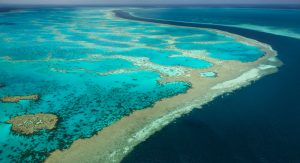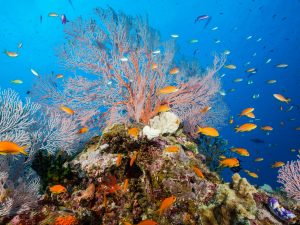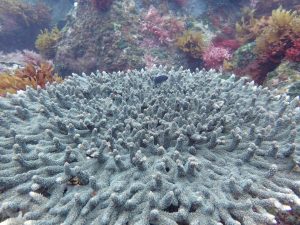
Our planet is a delicate web of interconnected ecosystems, and few places exemplify this intricate balance better than the Great Barrier Reef. Nestled in the Coral Sea off the coast of Queensland, Australia, the Great Barrier Reef is a natural wonder, a kaleidoscopic underwater world that supports an astonishing array of marine life. However, this magnificent ecosystem is facing unprecedented threats, and the need for its preservation has never been more critical. Read on to find out how the Great Barrier Reef Supports Biodiversity…
The Importance of the Great Barrier Reef:
-
Biodiversity Hotspot:

- The Great Barrier Reef is a biodiversity hotspot, home to a staggering diversity of marine species, including coral, fish, mollusks, and countless other organisms.
- It shelters around 400 species of coral, 1,500 species of fish, and various endangered species such as the dugong, green sea turtle and some shark species.
-
Economic Value:
- Beyond its ecological significance, the reef is a crucial economic asset. It supports tourism and fisheries, providing livelihoods for local communities and contributing billions to the Australian economy.
-
Global Significance:
- As the world’s largest coral reef system, the Great Barrier Reef plays a vital role in the health of the global oceans. Its preservation is not just an Australian concern but a global responsibility.
Threats to the Great Barrier Reef:
-
Climate Change:

- Rising sea temperatures and ocean acidification due to climate change pose a severe threat to the reef. Coral bleaching, a phenomenon where corals expel the algae living in their tissues, is becoming more frequent and widespread.
-
Pollution:
- Runoff from agriculture, industrial activities, and improper waste disposal contribute to pollution in the reef’s waters. This pollution can lead to nutrient imbalances, harming the delicate symbiotic relationships within the ecosystem.
-
Overfishing:
- Overfishing depletes fish populations, disrupting the delicate balance of the reef ecosystem. It also threatens the livelihoods of those dependent on fishing and undermines the reef’s ability to recover from other stressors.
Preserving the Great Barrier Reef:
-
Climate Action:
- Mitigating climate change is essential for the reef’s survival. Countries worldwide must commit to reducing greenhouse gas emissions to limit global temperature increases and subsequent coral bleaching events.
-
Sustainable Practices:

- Adopting sustainable fishing practices and reducing pollution from land-based activities are crucial steps. Implementing and enforcing regulations to minimize runoff and control fishing practices can help protect the reef’s delicate balance.
-
Conservation and Research:
- Investing in conservation efforts and scientific research is paramount. This includes coral restoration projects, monitoring programs, and initiatives to enhance the reef’s resilience to environmental changes.
-
Education and Awareness:
- Raising awareness about the importance of the Great Barrier Reef and the threats it faces is vital. Education fosters a sense of responsibility among individuals, encouraging sustainable choices and support for conservation efforts. Nurturing Ocean Stewards.
The Great Barrier Reef stands as a testament to the beauty and diversity of our planet’s oceans. Its preservation is not just a matter of national pride for Australia; it’s a global imperative. By addressing climate change, adopting sustainable practices, and investing in conservation, we can become guardians of the ocean, ensuring that the Great Barrier Reef continues to thrive for generations to come. The health of our oceans, and indeed the health of our planet, depends on the actions we take today to preserve this natural wonder. We hope you enjoyed reading out guide to how the Great Barrier Reef Supports Biodiversity.
Find out more about Human Impact with our free resources and our live marine animal programs.


